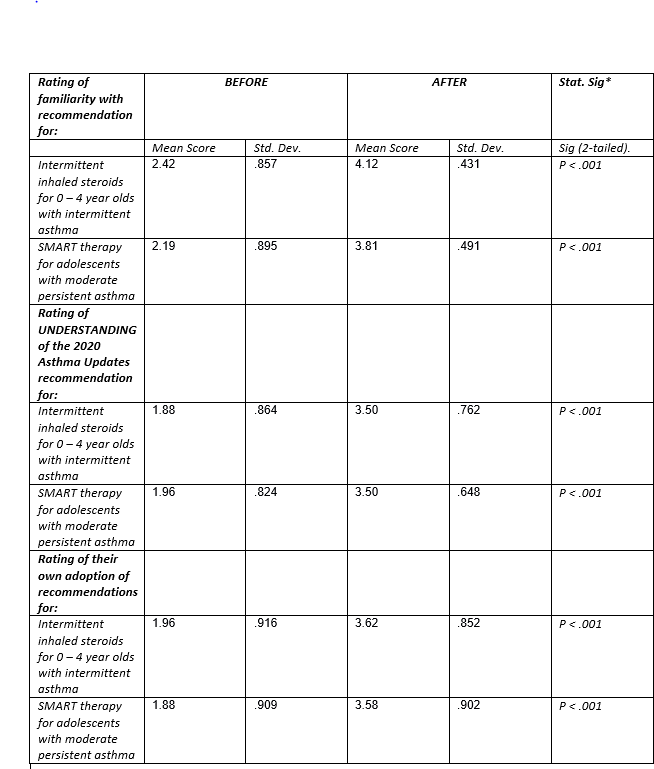Asthma
Category: Abstract Submission
Asthma
39 - Get SMART: Teaching selected recommendations from the 2020 Focused Asthma Updates
Sunday, April 24, 2022
3:30 PM - 6:00 PM US MT
Poster Number: 39
Publication Number: 39.300
Publication Number: 39.300
Karen L. Warman, Albert Einstein College of Medicine, Bronx, NY, United States; Ellen J. Silver, Albert Einstein College of Medicine, Bronx, NY, United States

Karen L. Warman, MD, MS (she/her/hers)
Associate Professor of Pediatrics
The Children's Hospital at Montefiore
New York, New York, United States
Presenting Author(s)
Background: The 2020 Focused Asthma Updates to the 2007 National Asthma Guidelines introduce paradigm-shifts in the treatment of asthma. Adoption of these changes has been challenging due to the complexity of the material. There is little in the literature about how to help clinicians adopt the new recommendations for intermittent inhaled steroids for young children with viral-induced wheeze and SMART (Single Maintenance and Reliever Therapy) therapy for older children and adolescents with moderate persistent asthma.
Objective: To examine whether a train-the-trainer, case-based educational program can increase pediatrician's familiarity, understanding and adoption of the new recommendations for pediatric asthma management introduced in the 2020 Focused Asthma Updates.
Design/Methods: Facilitators led groups of 4 – 6 pediatric residents in cased-based discussions during a 30 minute, ambulatory care-based educational session. One week prior to the conferences, pediatric residents and facilitators, were provided with synopses of the 2007 Guidelines and the 2020 Asthma Updates. Facilitators also received slides and a facilitator’s guide which further explained the new concepts, supporting data, and highlighted key learning objectives. 6 small group conferences were held with different facilitators presenting each day. Pre-post survey questions were accessed by participants using a QR code at the end of the presentation. These surveys used Likert scales to assess familiarity, understanding and adoption of two key updates to asthma management in the 2020 Asthma Updates before and after participating in the conference. The surveys also requested participants to provide reflection on the educational program.
Results: The participants were 19% 3rd year, 42% 2nd year and 35% 1st year residents and one 3rd year medical student. Prior to the conference, participants reported that they became aware of the 2020 Asthma Updates by: having read them 8%, attended a lecture 8%, read a journal article about the updates 12%, informally form other clinicians (62%) or were unfamiliar with them (12%). The cased-based approach was well-received and learners found the focus on the 2020 Focused Asthma Updates very relevant.Conclusion(s): This 30 minute, case-based, educational program significantly increased pediatric residents' familiarity, understanding and plans to adopt two new treatment recommendations introduced in the 2020 Focused Asthma Updates. Dissemination of this program may help increase adoption of the 2020 Focused Asthma Update's recommendations to improve asthma care.
Pre-post Conference Survey Results (N = 26) * Wilcoxon signed rank test.
* Wilcoxon signed rank test.
Objective: To examine whether a train-the-trainer, case-based educational program can increase pediatrician's familiarity, understanding and adoption of the new recommendations for pediatric asthma management introduced in the 2020 Focused Asthma Updates.
Design/Methods: Facilitators led groups of 4 – 6 pediatric residents in cased-based discussions during a 30 minute, ambulatory care-based educational session. One week prior to the conferences, pediatric residents and facilitators, were provided with synopses of the 2007 Guidelines and the 2020 Asthma Updates. Facilitators also received slides and a facilitator’s guide which further explained the new concepts, supporting data, and highlighted key learning objectives. 6 small group conferences were held with different facilitators presenting each day. Pre-post survey questions were accessed by participants using a QR code at the end of the presentation. These surveys used Likert scales to assess familiarity, understanding and adoption of two key updates to asthma management in the 2020 Asthma Updates before and after participating in the conference. The surveys also requested participants to provide reflection on the educational program.
Results: The participants were 19% 3rd year, 42% 2nd year and 35% 1st year residents and one 3rd year medical student. Prior to the conference, participants reported that they became aware of the 2020 Asthma Updates by: having read them 8%, attended a lecture 8%, read a journal article about the updates 12%, informally form other clinicians (62%) or were unfamiliar with them (12%). The cased-based approach was well-received and learners found the focus on the 2020 Focused Asthma Updates very relevant.Conclusion(s): This 30 minute, case-based, educational program significantly increased pediatric residents' familiarity, understanding and plans to adopt two new treatment recommendations introduced in the 2020 Focused Asthma Updates. Dissemination of this program may help increase adoption of the 2020 Focused Asthma Update's recommendations to improve asthma care.
Pre-post Conference Survey Results (N = 26)
 * Wilcoxon signed rank test.
* Wilcoxon signed rank test.